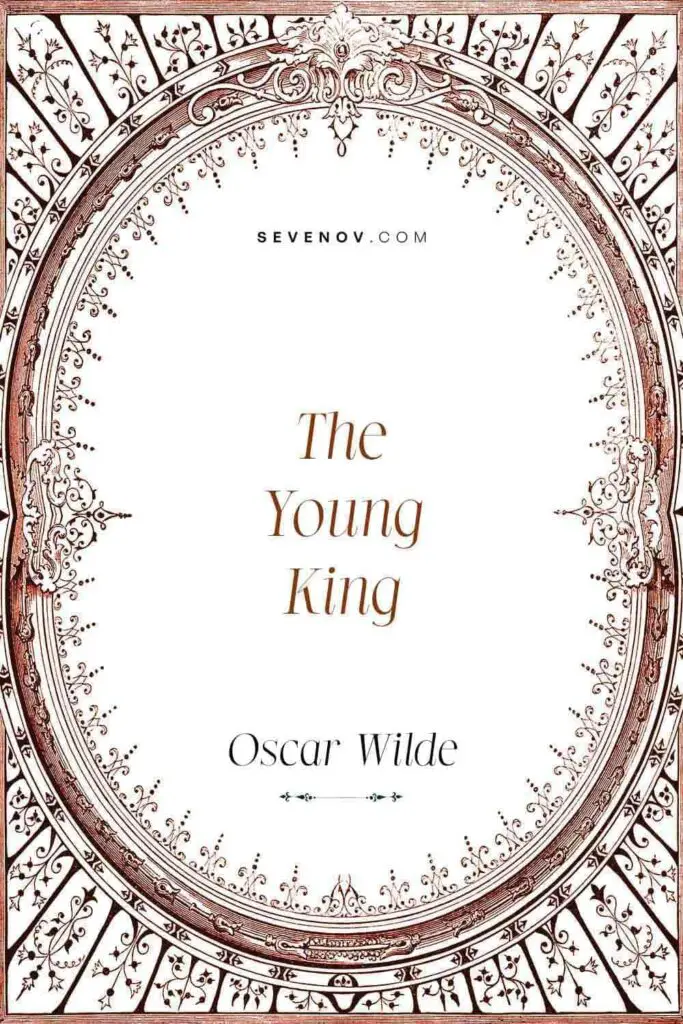
The Young King by Oscar Wilde
Author: Oscar Wilde
Published: 1891
Genre: Fairy Tale, Short story
“The Young King” is a short story by Oscar Wilde, part of the fairy-tale anthology, A House of Pomegranates, published in 1891. Other short stories in this collection are “The Birthday of the Infanta,” “The Fisherman and his Soul,” and “The Star-Child.”
1. The Young King Synopsis
The events of “The Young King” occur in an unnamed country at an unidentified historical period, with strong religious and moral undertones permeating the narrative.
A 16-year-old boy serves as the protagonist of the narrative. Despite being raised in poverty, when he becomes king, all that comes to mind are expensive and exquisite things. After having three horrible dreams, he drastically adjusts his attitude about a luxurious lifestyle. He witnesses in his nightmares how others endure hardship and even death to acquire and produce the goods for him.
2. The Young King Summary
Act 1
A meager goatherd and his wife raised The Young King for most of his early years. He doesn’t realize he is the Old King’s grandson since he thinks the poor couple are his parents. He had a princess mother. Although his father’s exact name is unclear, there are rumors that he was either a painter or a musician.
Soon after the child was born, his mother died and was hurriedly buried. Some claim the boy’s deceased father was interred in the same grave. The childless goatherd and his wife received the baby son. On his deathbed, sixteen years later, the Old King acknowledges the child as his heir.
The Young King cheerfully tosses off his worn-out wool robe and leather tunic as soon as he enters the palace. He quickly develops a fascination for artistic creations and other rare and exquisite items. He sends his agents worldwide to look for such things on his behalf. He focuses all of his thoughts on the gold cloak, ruby-studded crown, and pearl-studded scepter he will wear and wield at his approaching coronation.
Act 2
The Young King experiences three terrifying nightmares the night before his coronation. He sees the weavers creating his gold-cloth garment in his first dream. Men, women, and kids who weave are all pallid and skinny.
One of the weavers explains to the King that they are representative of the poor, being compelled to labor hard to manufacture goods for others that they will never afford for themselves. Although they are technically free, the weaver maintains that they are merely the rich’s slaves.
In the second nightmare, the Young King is on a sizable ship, being rowed by many slaves off the coast of Arabia. One of the slaves, having wax poured into his ears and nostrils, is made to dive into the ocean in search of pearls. The slave returns to the ship several times, each time carrying a single pearl.
The slave passes away when the slavemaster finally announces that he has delivered a pearl fit for the Young King’s scepter. The Young King finds himself on the outskirts of a jungle in the final nightmare. He sees workers excavating for rubies to adorn his crown. Three successive plagues kill all the miners.
Act 3
The next day, the Young King refuses the cloak, crown, and scepter. The Young King’s subjects make fun of his appearance as he travels to the cathedral for his coronation. They don’t seem impressed when he tells them about his dreams. From among the crowd, one impoverished man steps forward. The speaker claims that to survive, the poor depend on affluent people’s desire for luxury. He acknowledges that serving a strict master is uncomfortable. However, he continues that working and having money for food is preferable.
The bishop is taken aback by the Young King’s attire when they are inside the cathedral. The bishop brings up the fact that there are a lot of issues in the world and that it is hard for the King to address them all after hearing about the three dreams. Dissatisfied with what the bishop had said, the Young King passes the bishop and turns to the altar to pray.
Some lords enter the cathedral brandishing weapons. They assert that the Young King, dressed like a peasant, is unfit to rule them and that they are ready to kill him. The Young King finishes his prayer and turns to address the nobles. The Young King now appears to be donning a gold cloth cloak as sunlight enters the room through the stained glass window.
At the same time, lilies “whiter than pearls” miraculously bloom on his shepherd’s crook, and roses “redder than rubies” miraculously bloom on his crown of vines. The nobles put away their swords and bowed down before the King. The bishop also bows down before him and says, “A greater than I hath crowned thee.”




